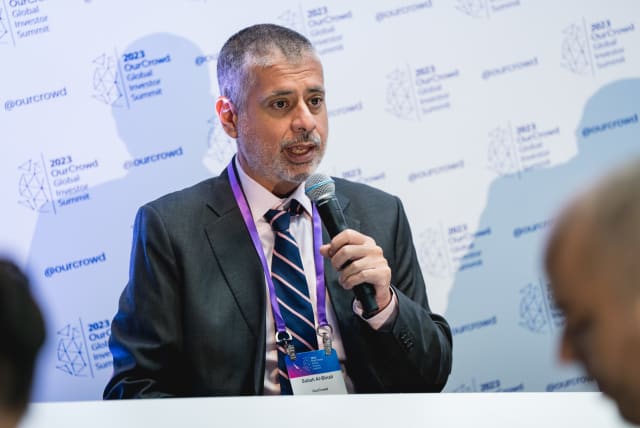Israel-UAE differences are a chance to fulfill Abraham Accords potential - exec.

OurCrowd Arabia’s partner and executive chairman Dr. Sabah al-Binali explains the current challenge facing the realization of the historic Abraham Accords’ business potential.
On September 15, the world marked the anniversary of the groundbreaking Abraham Accords. This historic agreement, signed between Israel, the United Arab Emirates, and Bahrain, and later joined by Sudan and Morocco, has ushered in a new era of peace and collaboration in the Middle East.
To gain deeper insights into the impact of this milestone, The Jerusalem Post sat down with Dr. Sabah al-Binali, partner and executive chairman of OurCrowd Arabia, the Gulf-based branch of the renowned Israeli venture capital fund OurCrowd.
Binali’s unique perspective as a key player in the region’s economic landscape promises to shed light on the profound changes brought about by the accords and their enduring significance in an ever-evolving global business landscape.
How has collaboration evolved among diverse groups in the three years since the Abraham Accords?
Over the past three years, as people from diverse backgrounds have begun to come together, they’re gradually discovering how to collaborate effectively and meet each other’s needs.
As we commemorate the three-year anniversary of the Abraham Accords in September, it also marks my three-year journey as a partner with OurCrowd, so I have that experience, and what I see is that people had a lot of positivity and hope based on the Abraham Accords – and they really should – but I think that it wasn’t as clear to them that this is just the first step, which you then need to build upon.
What role did you see the government sector playing in the context of the Abraham Accords, and how has this dynamic influenced the private sector’s understanding of the investment needed to translate the accords’ potential into tangible business opportunities?
Normally, it’s the private sector that leads, but in this case, the government sector took the lead, forging new pathways between us. The private sector, driven by this optimism, may not have fully grasped the level of investment – not financial investment but personal investment – required to turn this potential into actual business reality.
I personally am very optimistic, because my expectations of [the accords’] potential are actually higher than what I hear being reported. But I always believed that it will happen over a longer period of time. Not for decision-making or anything but in order to learn how to work with each other.
The idea of collaboration is clearly one of the headlining challenges being presented here. What does overcoming that challenge look like?
The real key to all of this is in seeing ourselves as complementing each other. In the news and discussions, people often point out differences [between UAE and Israeli business culture].
But differences are not just a challenge. They’re also an opportunity. It’s complementary. And, the opportunity will be realized when the private sector on both sides starts having a meeting of minds on how they can better complement each other.
Jerusalem Post Store
`; document.getElementById("linkPremium").innerHTML = cont; var divWithLink = document.getElementById("premium-link"); if (divWithLink !== null && divWithLink !== 'undefined') { divWithLink.style.border = "solid 1px #cb0f3e"; divWithLink.style.textAlign = "center"; divWithLink.style.marginBottom = "15px"; divWithLink.style.marginTop = "15px"; divWithLink.style.width = "100%"; divWithLink.style.backgroundColor = "#122952"; divWithLink.style.color = "#ffffff"; divWithLink.style.lineHeight = "1.5"; } } (function (v, i) { });

